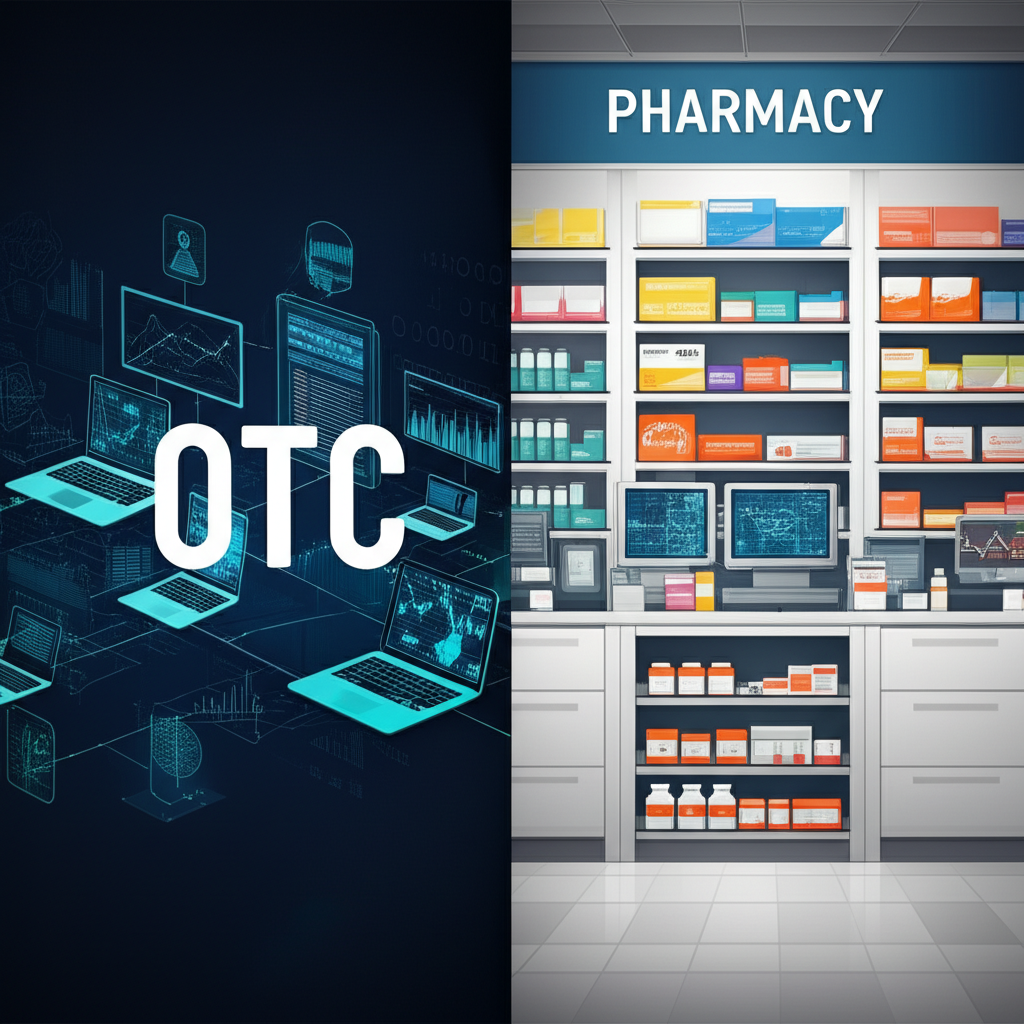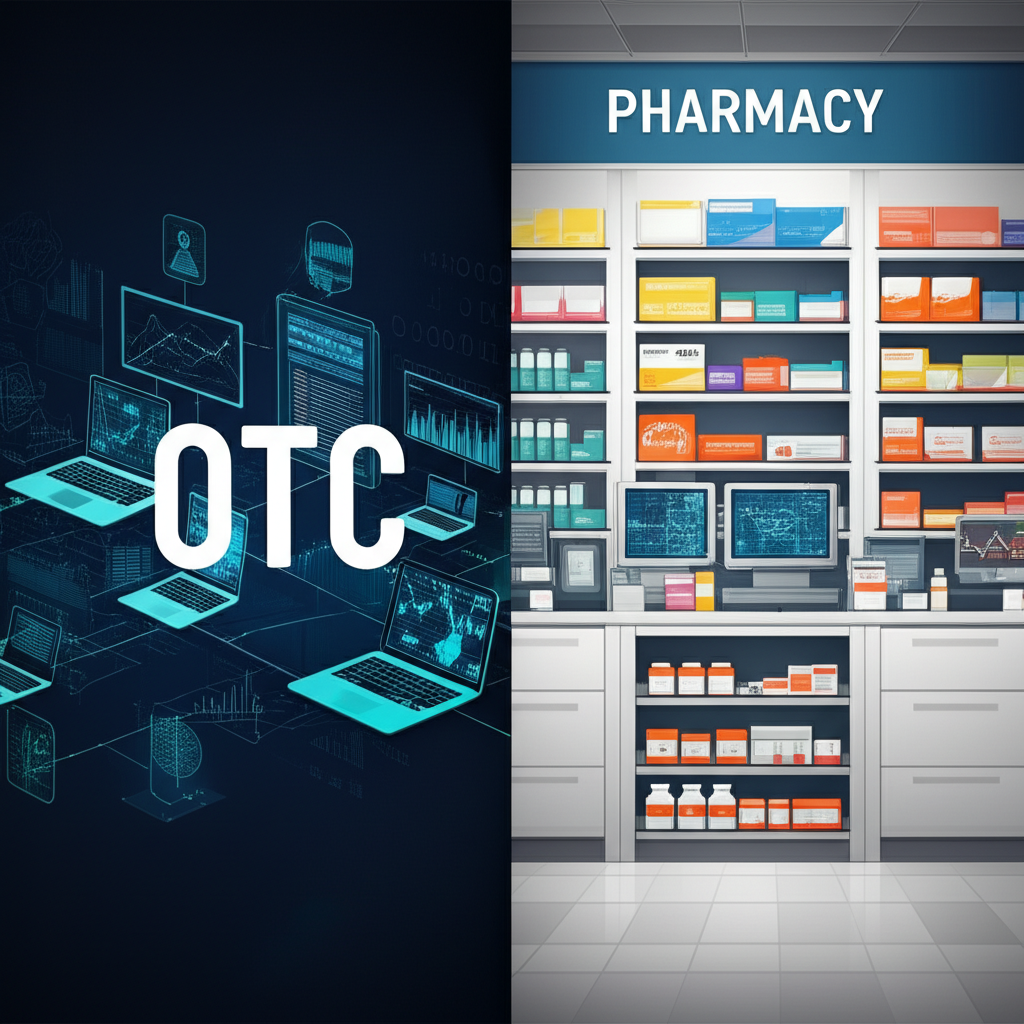Introduction: What Does OTC Stand For?

The term “OTC” is widely recognized across industries, yet its meaning shifts dramatically depending on context. At its core, OTC stands for “Over-the-Counter,” a phrase that describes transactions or access occurring outside formal, centralized systems. In finance, it refers to the direct trading of securities between parties without the oversight of a traditional exchange. In healthcare, it identifies medications available to consumers without a prescription. These two definitions dominate public understanding, but the concept of over-the-counter extends into other domains, including cryptocurrency and informal workplace language. This article explores the full scope of OTC, unpacking its significance in financial markets, digital assets, pharmaceuticals, and beyond—offering clarity for investors, consumers, and professionals navigating its many applications.
OTC Meaning in Finance: The Over-the-Counter Markets

Over-the-Counter (OTC) markets form a critical yet often overlooked segment of the global financial system. Unlike the structured environment of major stock exchanges such as the NYSE or NASDAQ, OTC trading operates through a decentralized network where transactions occur directly between counterparties. This model allows for greater flexibility and access to a broader range of financial instruments, particularly those that don’t meet the stringent listing requirements of formal exchanges. While less visible to retail investors, OTC markets play a vital role in facilitating trades for bonds, derivatives, and smaller equities, serving both institutional players and niche investors.
What Are Over-the-Counter Markets?
OTC markets are not physical locations or centralized platforms. Instead, they consist of a web of broker-dealers who communicate via electronic systems, phone calls, and messaging networks to negotiate trades. These markets enable the buying and selling of stocks, bonds, commodities, and other financial products without the need for a regulated exchange. Because there’s no central clearinghouse guaranteeing trades, the process relies heavily on the creditworthiness and reputation of the involved parties. This structure supports customized agreements and private transactions, making it especially useful for large institutional trades or unique financial instruments that don’t fit standard exchange criteria.
How OTC Securities Are Traded

Trading in OTC securities typically involves market makers—brokerage firms or financial institutions that provide liquidity by quoting both buy (bid) and sell (ask) prices for specific assets. When an investor wants to trade an OTC security, their broker contacts one or more market makers to execute the transaction. The trade is completed bilaterally, meaning the two parties settle directly with each other. This contrasts sharply with exchange-based trading, where orders are matched anonymously and cleared through a central authority. The absence of a central intermediary increases counterparty risk but also allows for tailored terms and pricing, especially beneficial in complex or large-volume deals.
Common Types of OTC Securities and Products
A diverse array of financial instruments finds a home in OTC markets due to their unique characteristics or the issuer’s inability to meet exchange listing standards. Key categories include:
- Penny stocks: Low-priced shares of small companies that often fail to meet minimum capitalization or reporting requirements for major exchanges.
- Corporate and municipal bonds: Most fixed-income securities are traded OTC, particularly those issued by local governments or smaller corporations.
- Derivatives: Customized contracts like interest rate swaps, credit default swaps, and forward agreements are frequently negotiated OTC to suit specific risk management needs.
- Foreign exchange (Forex): The global currency market operates almost entirely on an OTC basis, with banks and financial institutions trading directly around the clock.
- Unlisted or delisted stocks: Companies that choose not to list or have been removed from major exchanges due to non-compliance may continue trading in OTC markets.
Key Characteristics of OTC Trading
OTC markets differ from traditional exchanges in several fundamental ways:
- Decentralized structure: No single marketplace or physical trading floor.
- Customization: Parties can negotiate terms such as price, volume, and settlement conditions.
- Lower listing barriers: Companies can have their securities quoted without undergoing rigorous exchange approval processes.
- Variable liquidity: Some OTC assets, like major forex pairs, are highly liquid, while others, such as obscure penny stocks, may be difficult to trade.
- Accessibility: Provides investment opportunities in securities otherwise unavailable to the public.
Advantages and Disadvantages of OTC Markets
While OTC trading offers distinct benefits, it also carries notable risks. Investors must weigh these factors carefully when considering participation in these markets.
| Advantages of OTC Markets | Disadvantages of OTC Markets |
|---|---|
| Lower entry barriers for companies seeking to trade publicly | Higher risk due to reduced regulatory oversight |
| Access to specialized or niche investment products | Lower liquidity for many securities, especially micro-cap stocks |
| Greater flexibility in structuring trades | Increased vulnerability to market manipulation and fraud |
| Potential for high returns in underfollowed or emerging markets | Price volatility can be extreme, particularly in thinly traded stocks |
| Privacy for large institutional trades | Limited transparency in pricing and corporate disclosures |
Despite the appeal of accessing early-stage companies or unique financial instruments, investors should approach OTC markets with caution. The lack of standardized reporting and real-time price data means that due diligence becomes even more critical.
Understanding OTC Regulation and Oversight
Although OTC markets operate outside formal exchanges, they are not lawless zones. In the United States, regulatory oversight is shared between federal agencies and self-regulatory organizations. The Securities and Exchange Commission (SEC) sets disclosure rules for public companies, including those whose shares trade over-the-counter. These rules require timely filing of financial statements and material events, helping to protect investors from misinformation.
The Financial Industry Regulatory Authority (FINRA), operating under SEC supervision, regulates broker-dealers who participate in OTC trading. FINRA maintains the OTC Bulletin Board (OTCBB) and enforces ethical standards among its members. Additionally, OTC Markets Group—a private entity—operates the primary electronic quotation system for OTC securities and organizes them into tiers based on transparency and reporting quality:
- OTCQX Best Market: Reserved for well-established companies with strong financials and full public disclosure.
- OTCQB Venture Market: Designed for early-stage firms that file regular reports with the SEC or a qualified international regulator.
- Pink Sheets (Open Market): The most speculative tier, featuring companies with minimal or no public reporting, posing the highest risk to investors.
This tiered framework helps investors assess risk levels, though regulatory scrutiny remains lighter than for exchange-listed equities. For example, while SEC reporting requirements apply to many OTCQX and OTCQB companies, Pink Sheet issuers may disclose little to no financial data. More information on investor protections and compliance rules can be found on the SEC website.
OTC Meaning in Cryptocurrency
In the world of digital assets, OTC trading has become a cornerstone for institutional participation. Here, OTC refers to private, off-exchange transactions involving large volumes of cryptocurrencies such as Bitcoin or Ethereum. Rather than placing massive buy or sell orders on public exchanges—where such activity could trigger sharp price swings—investors use OTC desks to execute trades directly with counterparties.
These OTC desks act as intermediaries, connecting buyers and sellers while offering access to deep liquidity pools. By negotiating a fixed price in advance, institutions can avoid slippage and minimize market impact. This method also provides enhanced privacy, as trades do not appear on public order books. As the crypto market matures, OTC desks have grown in importance, serving hedge funds, family offices, and corporate treasuries looking to move significant amounts of digital assets efficiently and discreetly.
OTC Meaning in Medicine: Over-the-Counter Drugs
In healthcare, “OTC” takes on a completely different meaning, referring to medications that consumers can purchase without a prescription. These drugs are widely available in pharmacies, supermarkets, and online retailers, offering convenient treatment for common conditions like headaches, allergies, colds, and heartburn. Common examples include ibuprofen, acetaminophen, antihistamines, and topical antifungals.
Regulatory bodies such as the U.S. Food and Drug Administration (FDA) determine which medications qualify for OTC status based on safety, efficacy, and ease of use. To be approved, a drug must have a wide therapeutic margin, low potential for abuse, and clear labeling that enables consumers to self-diagnose and treat effectively. The FDA maintains strict guidelines to ensure that OTC medicines remain safe when used as directed. Detailed information about nonprescription drug regulations is available on the official FDA website.
Other Contexts: OTC Slang and Less Common Uses
Beyond finance and medicine, the acronym “OTC” occasionally appears in informal or niche settings. In workplace slang, it might stand for “Off The Clock,” indicating someone is not working or unavailable. Similarly, “Out To Lunch” is sometimes abbreviated as OTC in casual conversation, though this usage is rare and context-dependent. These interpretations lack formal recognition and are generally not used in professional or academic writing. In most serious discussions—especially those involving investment, health, or policy—”Over-the-Counter” in its financial or pharmaceutical sense remains the standard interpretation.
Conclusion: The Versatility and Importance of “OTC”
“OTC” is a powerful example of how a single acronym can carry vastly different meanings depending on context. Whether describing the decentralized trading of securities, the private exchange of large cryptocurrency holdings, or the everyday purchase of pain relievers at a drugstore, understanding the environment in which the term is used is essential. For investors, recognizing the risks and opportunities in OTC financial markets can inform smarter portfolio decisions. For consumers, knowing what OTC means in medicine ensures safe and effective self-care. Across sectors, the concept of “over-the-counter” reflects a broader theme: access outside traditional gatekeepers. As markets and technologies evolve, so too will the applications of OTC—making continued awareness all the more important.
Frequently Asked Questions About OTC Meaning
1. What is the primary definition of OTC in financial markets?
In financial markets, OTC primarily refers to “Over-the-Counter” markets, which are decentralized venues where securities are traded directly between two parties through a network of broker-dealers, rather than on a centralized exchange.
2. How do over-the-counter securities differ from exchange-listed securities?
OTC securities are traded directly between parties without a central exchange, often having less stringent listing requirements and regulatory oversight. Exchange-listed securities, conversely, trade on centralized exchanges (like NYSE or NASDAQ) which have stricter listing rules, higher transparency, and standardized trading protocols.
3. Are OTC markets regulated, and if so, by whom?
Yes, OTC markets are regulated, though generally less strictly than major exchanges. In the U.S., the Financial Industry Regulatory Authority (FINRA) oversees broker-dealers involved in OTC transactions, and the SEC sets disclosure requirements for public companies, including many traded OTC. Private organizations like OTC Markets Group also provide regulated tiers with varying levels of transparency.
4. What types of products are typically traded over-the-counter?
- Penny stocks
- Corporate and municipal bonds
- Customized derivatives (e.g., swaps)
- Foreign exchange (Forex)
- Unlisted or delisted stocks
5. What are the main risks associated with investing in OTC stocks?
Key risks include lower liquidity, reduced transparency due to less stringent reporting requirements, higher potential for price volatility and manipulation, and increased difficulty in obtaining reliable company information compared to exchange-listed stocks.
6. Can “OTC” refer to something other than finance or medicine?
While less common and typically informal, “OTC” can occasionally be used as slang (e.g., “Off The Clock” or “Out To Lunch”). However, in professional and formal contexts, its meaning is almost exclusively tied to finance or medicine.
7. How does OTC trading work in the context of cryptocurrency?
In crypto, OTC trading involves large-volume transactions executed directly between parties (often institutions or high-net-worth individuals) and an OTC desk, bypassing public exchanges. This helps prevent significant price slippage and offers greater privacy for substantial trades.
8. What should I know before buying over-the-counter medicines?
Before buying OTC medicines, always read the label carefully for dosage, active ingredients, warnings, and potential side effects. Ensure it addresses your symptoms, check for drug interactions if you take other medications, and consult a healthcare professional if symptoms persist or worsen.
9. What is the difference between OTCQX, OTCQB, and Pink Sheets?
These are different tiers of the OTC Markets Group. OTCQX is the top tier for financially strong, transparent companies. OTCQB is for early-stage companies that report to a U.S. or international regulator. Pink Sheets (Open Market) is the most speculative tier, with varying disclosure levels, ranging from comprehensive to limited or no public information.
10. Is OTC trading suitable for all investors?
No, OTC trading, especially in highly speculative securities like penny stocks, is generally not suitable for all investors. It often carries higher risks due to lower liquidity, less transparency, and potential for fraud, making it more appropriate for experienced investors with a higher risk tolerance and a thorough understanding of the specific market.

留言